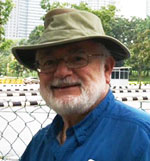WWII Austrian Catholic Conscientious Objector Executed

 RICHMOND, California — Opposition to Nazi power is a theme of two stories set in the Austrian Alps. The musical The Sound of Music by Richard Rodgers and Oscar Hammerstein II featuring the von Trapp Family Singers appeared on Broadway in 1959. The 1965 film starring Julie Andrews and Christopher Plummer broke Gone with the Wind box office records. It ran 174 minutes and won five Academy awards. The sound track sold over 20 million albums. It was loved.
RICHMOND, California — Opposition to Nazi power is a theme of two stories set in the Austrian Alps. The musical The Sound of Music by Richard Rodgers and Oscar Hammerstein II featuring the von Trapp Family Singers appeared on Broadway in 1959. The 1965 film starring Julie Andrews and Christopher Plummer broke Gone with the Wind box office records. It ran 174 minutes and won five Academy awards. The sound track sold over 20 million albums. It was loved.
The rolling green fertile foothills beneath the rocky peaks of the Austrian Alps is also the setting for A Hidden Life. Terrence Malick wrote the screenplay and directed the film. It also runs 174 minutes but no Oscar nominations. The story about conscientious objectors, prisoners of conscience, the bearers of the nobility of the pure soul, are not limited by time, space, faith, race or ethnicity.
Malick’s many film credits include Badlands (1973) and The Thin Red Line (1998).
A Hidden Life comes from a deep place in Malick’s life. He earned a degree in philosophy at Harvard in 1965 and studied Kierkegaard, Martin Heidegger and Wittgenstein as a Rhodes scholar at Oxford. He started filming A Hidden Life in 2016.
Franz Jägerstätter was born in 1907. He was a devout Catholic, a farmer, with a wife and three young children. He was deeply conflicted about serving in the Wehrmacht after Hitler annexed Austria. As a conscientious objector he defied the draft and refused to serve as a non-combatant hospital orderly or sign the loyalty oath to Hitler. He spoke with his parish priest and bishop. There was tension between the Catholic church and the Nazi regime. He placed duty to faith ahead of country, neighbors, wife or children. Franz’s conscience would not bend, he was a conscientious objector. He was arrested, imprisoned in Berlin, tortured and brutalized, tried as a traitor, and condemned to death.
Franz and his wife exchanged letters while he was in prison. They are touching and deflecting. They had to pass the censors scrutiny, and had either party truthfully told about their existence in prison and ostracism in the village, each would have been more miserable. Franz was executed by guillotine in 1943. His deeply pious wife Franziska Schwaninger died in 2013 at the age of 100.
For over half a century we have sung and hummed the Sound of Music and dreamily recalled Julie Andrews. The soundtrack for A Hidden Life was composed by James Newton Howard. Further credits include Bach, Beethoven, Dvorak, Handel’s “Israel in Egypt,” and “Sarah was Ninety Years Old” by Arvo Pärt.
While watching the CD, we hoped and waited for the Allies to bomb the prison where Franz was incarcerated. He was an attractive, single-minded character who exhibited humble courage. Posthumously he has joined the ranks of Dietrich Bonhoeffer, a Lutheran anti-Nazi dissident and a founding member of the Confessing Church who was arrested in April 1943. He was hung in 1945 at the age of 39 in Flossenbürg concentration camp, 21 days before Hitler committed suicide.
Franz received a Stolperstein (Stumbling Stone) in 2006 and was declared a martyr by Pope Benedict XVI and beatified in 2007. The words Jew and anti-Semitism were not in the script. Jägerstätter opposed totalitarian power that took life contravening human and religious rights. I am reminded of the treatment of the South Dakota Hutterite conscientious objectors imprisoned in Alcatraz in 1917.
The Academy of Motion Picture Arts and Sciences should create an ethics Oscar.
*
Pollak, a professor emeritus of history at the University of Nebraska Omaha, and a lawyer, is a correspondent now based in Richmond, California. He may be contacted via oliver.pollak@sdjewishworld.com